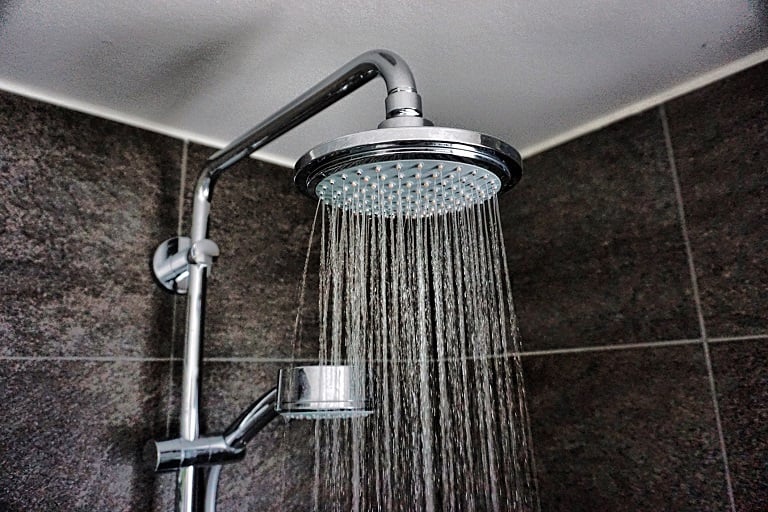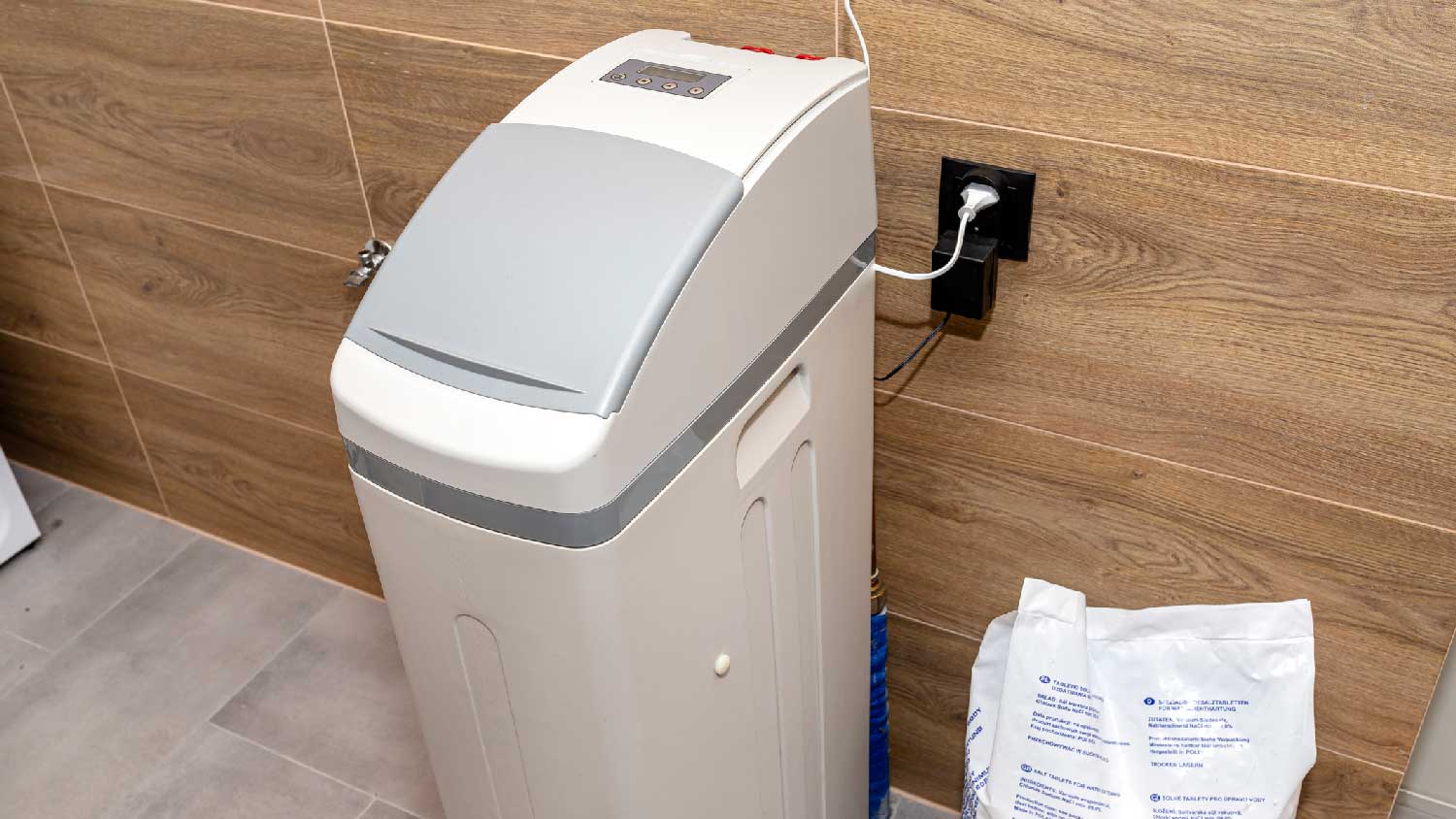Salt-Free Water Softeners: Everything You Need to Know
Understand the pros and cons of a salt-free water softener before going saltless


Salt-free water softeners don’t actually soften your hard water.
These softeners prevent hard minerals from attaching to surfaces.
Salt-free water conditioners cost between $800 and $4,000 on average.
Salt-free softeners cost more upfront but require less maintenance than salt-water softeners.
If you have hard water, then you know what a pain that can be. Hard water leaves mineral deposits on your skin, dishes, and clothing and can even speed up the deterioration of your plumbing and appliances. Water softeners can help in battling the scaly beast of hard water, and lots of homeowners are turning to salt-free water softeners to get the job done. But should they? In this guide, we’ll show you the pros and cons of these increasingly popular systems.
What Are Salt-Free Water Softeners?
Technically, salt-free water softeners don’t “soften” the water at all. They’re not true water softeners; they’re descalers or water conditioners. Salt-free water conditioners work by altering the chemical structure of water minerals through the descaling process, which prevents solids from depositing in pipes and water-using fixtures.
On the other hand, conventional water softeners work by using salt or potassium chloride to remove minerals like calcium and magnesium—which cause hard water—through an ionic exchange process and replace them with soft minerals like potassium and sodium.
The Pros of Salt-Free Water Softeners
Saltless water conditioners have a lot of advantages. Like conventional water softeners containing salt, saltless systems can help reduce the buildup of limescale, the chalky substance you see in dried hard water spots, as well as other chemicals.
Not only this, but saltless water softener systems don’t waste water like other types of water softeners can. They also tend to cost less to operate and require less maintenance. And because the systems tend to be simpler and less upkeep-intensive, these water softeners last at least as long as conventional softeners, around 10 years, if not longer.
That means you can use all that money you’re saving on system maintenance for something a bit more fun—maybe some shiny new faucets to replace the ones scarred by limescale and calcium. Conditioned water also doesn’t have the “slippery” feel you get from a water softener.
Cons of Salt-Free Water Softeners

For all the pluses of saltless water softeners, there are also some minuses. Salt-free systems are more expensive than conventional systems. Conventional water softener installations cost between $500 and $1,700, depending on the water softener size and type of system, and salt-free water conditioners average between $800 and $4,000.
Another concern with no-salt systems is they’re not as effective in places where water sits, like in your water heater. Those areas can still get a buildup of limescale.
Another issue is that saltless water conditioners don’t work equally well in all conditions or for all systems. For instance, salt-free conditioners generally should not be used with well water. Also, the types of contaminants you have in your water, which can vary widely from one municipality to another, can affect the operation of your system.
Some saltless conditioners work really well, and others don’t live up to their claims, so it’s important to research your options thoroughly. Reach out to a local water specialist if you’re considering one but aren’t sure what’s right for your home.
Traditional vs. Salt-Free Water Softeners
Traditional water softeners could be a better choice for your home if you want to remove hard minerals from your water. Some water softeners go above and beyond removing just calcium and magnesium and remove other harmful particles like iron and chlorine. It’s a good idea to test your hard water to see where your drinking water falls on the water hardness scale to determine whether it’s best to go for a traditional water softener.
At the same time, a traditional water softener regenerates regularly, so you may need to invest in a drain line to remove the minerals as they collect in a traditional water softener system.
Salt-based water softeners also add trace amounts of salt to your water, which can be a problem for those with high blood pressure. If you want to avoid consuming sodium and don’t want to deal with a drain line and the maintenance that comes with a traditional water softener, then a salt-free water softener could be the right choice.
Advantages of Installing a Water Softener
Depending on where you live and the amount and type of contaminants in your water, you may need to bite the bullet and opt for a water softener over a saltless water conditioner.
Consider the following benefits of installing a water softener in your home:
“People with extreme sodium sensitivities should avoid softeners that add sodium to their water.”
— Johnny Pujol, CEO and Water Expert for Tap Score Water Testing and SimpleLab, Inc., Berkeley, CA
Water softeners can extend the life of your appliances by reducing the impact of mineral deposits and hard water.
They can reduce the occurrence of clogs and poor water flow in your plumbing.
When your appliances and plumbing work more efficiently, you may save on your utility bills.
If you’re struggling with dry skin and hair, you might see improvements with fewer minerals in your water.
By mitigating hard water, your clothes will come out cleaner and last longer.
With water conditioners, though, the effects may not be as significant or protective. Limescale can still build up in some appliances, such as your water heater if you only use a water conditioner.
Is a Salt-Free Water Softener Right for Your Home?
Salt-free water softeners certainly have their pros, as they can be highly effective in removing water contaminants without wasting your water. They also require less maintenance than conventional water softeners.
Still, the cons are that saltless water conditioners may not be as effective as conventional water softeners in certain situations. And that means that saltless systems may not extend the life of your appliances and plumbing as much as conventional ones. In other words, you’ll likely need to do a bit of homework to figure out which system is best for you. Talk to a water softener company near you about your options.
Frequently Asked Questions
The best water softener for your home depends on your personal preferences, water quality, and budget. If you want a low-maintenance water softener with low long-term costs, no sodium, and non-slippery water textures, then a salt-free water softener could be better for you. If you want truly purified water that lacks unwanted minerals and is well-water and water heater-friendly, then a salt-based water softener may be better.
Again, the best type of softener depends on what you’re looking for in a water softener system. If you want truly purified water, then you might want to invest in a reverse osmosis system, which filters out more than just calcium and magnesium. Water purification systems are the best at removing unwanted minerals.
Yes, you can drink water that’s gone through a salt-free water softener. Salt-free water softeners are especially good to drink from for anyone who has to limit their sodium intake due to health reasons but still wants filtered water. Salt-free water softeners are also great for shower and bath water for people with skin sensitivities.





- What’s the Difference Between a Salt vs. Salt-Free Water Softener?
- Water Softener vs. Conditioner: Key Differences and When to Choose Each
- 7 Tips on How to Choose a Water Softener That’s Right for Your Home
- 4 Types of Water Softeners and How to Choose the Right One
- Water Softener vs. Water Filter: Which One Is Right for Your Home?
- What Is a Water Softener and Is It Right for Your Home?
- 11 Essential Water Softener Maintenance Tips
- A Water Softener Can Help Your Appliances Last for Years Longer
- 4 Water Softener Alternatives That Ditch the Salt
- Water Softener Regeneration: A Brilliantly Discreet Method for Removing Hard Water










